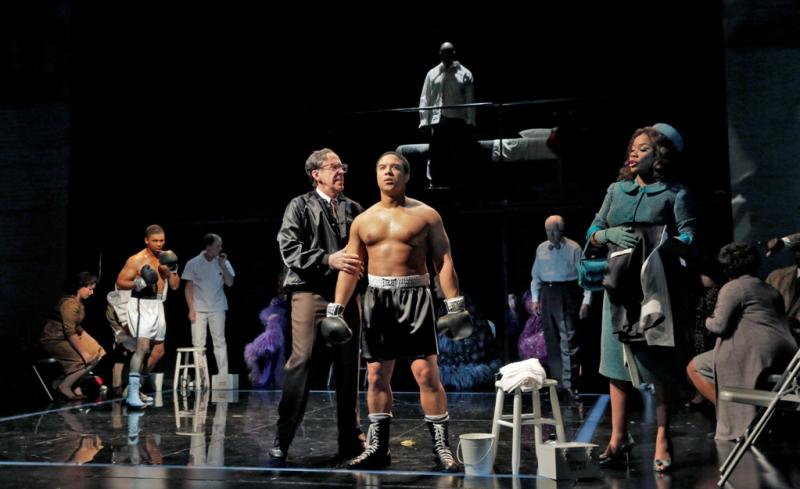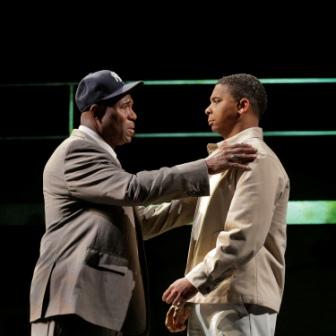theartsdesk in Saint Louis, Missouri: A Boxing Opera | reviews, news & interviews
theartsdesk in Saint Louis, Missouri: A Boxing Opera
theartsdesk in Saint Louis, Missouri: A Boxing Opera
A jazz opera enters the ring to portray the fight game

The Opera Theatre of Saint Louis has been sometimes dubbed the "Glyndebourne of America" due to the charming garden picnics enjoyed by patrons during the sizzling Missouri summer season. But that title also suggests the company's daring international programming. Since 1976 Opera Theatre has hosted 22 world premieres and 23 American premieres, almost certainly the highest percentage of new work of any American company.
Champion is the first of a three-year cycle of operas specifically dealing with “new American realities” and deliberately aimed to lure a broader, more diverse audience, meaning not just white and ideally under 60, an ambitious scheme in a city where racial division is still socially evident.
'I killed a man and the world forgives me / I love a man and the world wants to kill me'
Champion also has the honour of being perhaps the world's first full-length boxing opera, the only other close contenders being Shadowboxer, about Joe Louis, and a short work, Approaching Ali, recently mounted by Washington National Opera. Not to be confused with the gimmickry of "Chessboxing", the notion of "Opera Boxing" actually makes perfect sense. All the passion and physicality of the ring ensures steamy melodrama worthy of the grandest 19th-century operatic themes, while two highly artificial forms find their ultimate authenticity precisely within the regulations of their traditions. After all, both boxing and opera are known for their African-American celebrities, Blanchard's own father being a practising baritone.
And Champion is certainly rich in drama, revealing the extraordinary true tale of welterweight champion Emile Griffith, an immigrant from St Thomas in the Virgin Islands who was diverted from his original career as, yes, a hat designer to become instead a highly successful fighter. Then in 1962 Griffith found himself matched against Benny "Kid" Paret who made a point of dissing him as a “maricon”, Spanish slang for a homosexual, and inspiring Griffith to land some 17 blows in just seven seconds knocking Paret into a deep coma from which he never recovered. Griffith was haunted for the rest of his life by guilt at having killed his opponent, while also being equally disturbed by the very homosexuality with which he'd been taunted. Indeed, in a resonant irony, Griffith himself was later beaten unconscious by gay-bashers on leaving one of his nocturnal haunts.
 The full poignancy of this story is ably captured in the libretto by playwright-screenwriter Michael Cristofer (Witches of Eastwick, Bonfire of the Vanities). It begins with Griffith as an old man with memory loss trying to recall his youth and eventually essaying some reconciliation with his past through a meeting with the son of the man he slayed. The libretto delights in agile rhyme - “How does it feel/ Emile”, “in this corner/ in a coma” - and in a sort of poetically tweaked vernacular: “I killed a man and the world forgives me/ I love a man and the world wants to kill me.” The strength of the text is made clear thanks to surtitles, though St Louis is still sufficiently conservative that they simply leave out all the racier language, whether it's the word “ass” or a splendid aria commencing “well fuck me sideways.”
The full poignancy of this story is ably captured in the libretto by playwright-screenwriter Michael Cristofer (Witches of Eastwick, Bonfire of the Vanities). It begins with Griffith as an old man with memory loss trying to recall his youth and eventually essaying some reconciliation with his past through a meeting with the son of the man he slayed. The libretto delights in agile rhyme - “How does it feel/ Emile”, “in this corner/ in a coma” - and in a sort of poetically tweaked vernacular: “I killed a man and the world forgives me/ I love a man and the world wants to kill me.” The strength of the text is made clear thanks to surtitles, though St Louis is still sufficiently conservative that they simply leave out all the racier language, whether it's the word “ass” or a splendid aria commencing “well fuck me sideways.”
In fact, despite the potentially controversial subject matter - racism, homosexuality, prostitution - there is a certain curious conservatism to the final work, most especially Blanchard's score which is pleasingly lyrical, rich in its mounting elegiac lilt, finely modulated, yet ultimately perhaps too self-consciously crafted if not cautious. A beautiful song such as "This Night Is Long", as delivered with exceptional grace by Jordan Jones as the young Emile, and the resonant reprise "What Makes a Man a Man?" might be worthy of the great American songbook, but the overall effect is closer to, say, Gian Carlo Menotti than Porgy and Bess.
Here the social and cultural trajectory of African-American musical theatre could be perfectly plotted by putting Champion up against a work such as The Life and Times of Malcolm X by fellow jazz-composer Anthony Davis, making clear how the middlebrow will always finally trump the experimental. That said, Champion, especially in this strikingly designed production by Allen Moyer, provides a highly enjoyable bitter-sweet evening of vintage Americana, and an ultimately moving tribute both to a brave man's tragic existence and to the creative collaboration of two equally matched and equally multi-talented artists.
rating
Explore topics
Share this article
The future of Arts Journalism
You can stop theartsdesk.com closing!
We urgently need financing to survive. Our fundraising drive has thus far raised £49,000 but we need to reach £100,000 or we will be forced to close. Please contribute here: https://gofund.me/c3f6033d
And if you can forward this information to anyone who might assist, we’d be grateful.

Subscribe to theartsdesk.com
Thank you for continuing to read our work on theartsdesk.com. For unlimited access to every article in its entirety, including our archive of more than 15,000 pieces, we're asking for £5 per month or £40 per year. We feel it's a very good deal, and hope you do too.
To take a subscription now simply click here.
And if you're looking for that extra gift for a friend or family member, why not treat them to a theartsdesk.com gift subscription?
more New music
 Music Reissues Weekly: Chiswick Records 1975-1982 - Seven Years at 45 RPM
Triple-album 50th-anniversary celebration of the mould-breaking British independent label
Music Reissues Weekly: Chiswick Records 1975-1982 - Seven Years at 45 RPM
Triple-album 50th-anniversary celebration of the mould-breaking British independent label
 Album: Josh Ritter - I Believe in You, My Honeydew
The alt-country singer's latest isn't consistent but does hit highs
Album: Josh Ritter - I Believe in You, My Honeydew
The alt-country singer's latest isn't consistent but does hit highs
 Album: David Byrne - Who is the Sky?
Born to be weird
Album: David Byrne - Who is the Sky?
Born to be weird
 Edinburgh Psych Fest 2025 review - eclectic and experimental
Underground gems and established acts in this multi-genre, multi-venue day long festival
Edinburgh Psych Fest 2025 review - eclectic and experimental
Underground gems and established acts in this multi-genre, multi-venue day long festival
 Album: Faithless - Champion Sound
Three decades into their career the perennial dance duo nail a lengthy but likeable set
Album: Faithless - Champion Sound
Three decades into their career the perennial dance duo nail a lengthy but likeable set
 Album: Saint Etienne - International
British pop institution’s final communiqué is an unalloyed winner
Album: Saint Etienne - International
British pop institution’s final communiqué is an unalloyed winner
 Album: Brad Mehldau - Ride into the Sun
A sincere tribute to Elliott Smith
Album: Brad Mehldau - Ride into the Sun
A sincere tribute to Elliott Smith
 Music Reissues Weekly: The Outer Limits - Just One More Chance
Exhaustive anthology unearths the full story of the Sixties mod-pop band from Leeds
Music Reissues Weekly: The Outer Limits - Just One More Chance
Exhaustive anthology unearths the full story of the Sixties mod-pop band from Leeds
 theartsdesk Radio Show 37 - Pete Lawrence of the Big Chill discusses the power of protest music and his new project This Is The Fire
Talking to cultural activist Pete Lawrence – camp outs, singalongs and saving the world
theartsdesk Radio Show 37 - Pete Lawrence of the Big Chill discusses the power of protest music and his new project This Is The Fire
Talking to cultural activist Pete Lawrence – camp outs, singalongs and saving the world
 Album: Sabrina Carpenter - Man's Best Friend
Short but not so sweet
Album: Sabrina Carpenter - Man's Best Friend
Short but not so sweet

Add comment